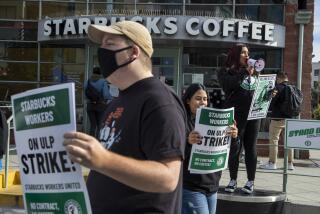High Court Hears ‘Threat-to-Self’ Disability Case
- Share via
WASHINGTON — Supreme Court justices struggled Wednesday with whether job applicants with a disease or a disability have a right to be hired for a job that might endanger their life or health.
On the one hand, the federal law governing disabled workers says that qualified applicants with a disease or an impairment are entitled to be hired on an equal basis with other job-seekers.
For the record:
12:00 a.m. March 1, 2002 FOR THE RECORD
Los Angeles Times Friday March 1, 2002 Home Edition Main News Part A Page 2 A2 Desk 2 inches; 46 words Type of Material: Correction
Hepatitis C--Stories published Tuesday and Thursday in Section A about a Supreme Court case involving a Los Angeles man with a liver ailment incorrectly described hepatitis C as “noninfectious.” While hepatitis C cannot be spread through casual contact, it can be spread through contact with the blood of an infected person.
While the law makes an exception for disabled or impaired workers who would pose a “direct threat” to the health or safety of others--for example, a police officer who fails to remain alert on duty because of an inability to control diabetes--it makes no exception for disabled or impaired individuals whose job might endanger only themselves.
However, the justices wondered how employers could be forced to hire a worker who is determined to undertake a dangerous risk to himself. They cited, as one example, an iron worker who suffers dizzy spells but nonetheless wants to work on a high-rise building.
Justice Anthony M. Kennedy noted that society wants employers to be considerate of their workers. But “you want the employer to take a position that is completely barbarous,” he told an attorney for a Los Angeles man who had sought a job at an oil refinery but was rejected after a pre-employment physical discovered a liver ailment.
Mario Echazabal was turned down for a job at the Chevron refinery in El Segundo because he had hepatitis C, a chronic, noninfectious liver disease that can progress to cirrhosis and liver failure. The company’s doctors said exposure to the chemicals and solvents at the plant might damage his liver and threaten his life.
Echazabal sued Chevron under the Americans with Disabilities Act, contending that the company had exaggerated his health problems. And beyond that, he maintained that it was his decision, not the company’s, whether to work in a job that might put his health at risk.
“There’s nothing wrong with me,” Echazabal told reporters outside the court Wednesday. He said he has been in good health and was fully capable of doing the job at the refinery.
Inside the courtroom, the justices seemed to agree with him on that point.
“It’s hard to say he was not qualified when he had worked there for more than 20 years,” Justice Sandra Day O’Connor told a lawyer for Chevron.
Since 1972, Echazabal had done various maintenance jobs at the El Segundo refinery for a private contractor. He sought a full-time job with Chevron in 1995.
Several justices said they were not convinced that Echazabal’s liver ailment was as serious as Chevron’s doctors suggested. They said they might ask U.S. District Judge Lourdes Baird in Los Angeles to reconsider the conflicting medical opinions in the case. Two medical experts said Echazabal’s liver could withstand the atmosphere at the refinery, but Baird dismissed the case anyway.
For the most part, the justices focused on the broad legal issue raised by the case of Chevron vs. Echazabal, 00-1406.
Justice Stephen G. Breyer, siding with Echazabal, said the disability-rights law put the decision in the hands of the worker.
“Most people don’t want to kill themselves. I suspect this is really a question of how risky it is . . . and who decides,” Breyer said.
Chevron’s lawyer, Stephen M. Shapiro, replied that employers think “safety first. That’s the motto. . . . If you recognize a hazard, you can’t send someone into that.” Moreover, employers could be sued or even prosecuted criminally if they expose a worker to a known danger, he said.
But Harvard Law School professor Samuel R. Bagenstos, who argued on behalf of Echazabal, said Congress did not authorize the use of a “threat-to-self standard” by employers.
Echazabal faces only “a small risk” of health trouble if he worked at the refinery, he said, citing the opinions of several doctors.
“The real question is who gets to decide. We believe Congress left the decision in the hands of the employee,” Bagenstos said.
The justices sounded closely split on the issue. They have several months to hand down a decision.
More to Read
Get the L.A. Times Politics newsletter
Deeply reported insights into legislation, politics and policy from Sacramento, Washington and beyond. In your inbox three times per week.
You may occasionally receive promotional content from the Los Angeles Times.











